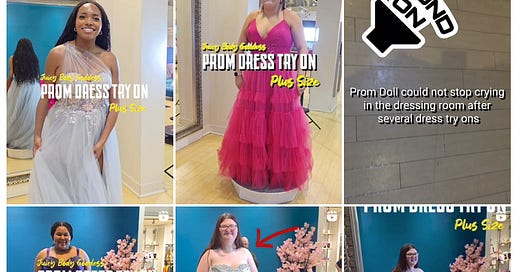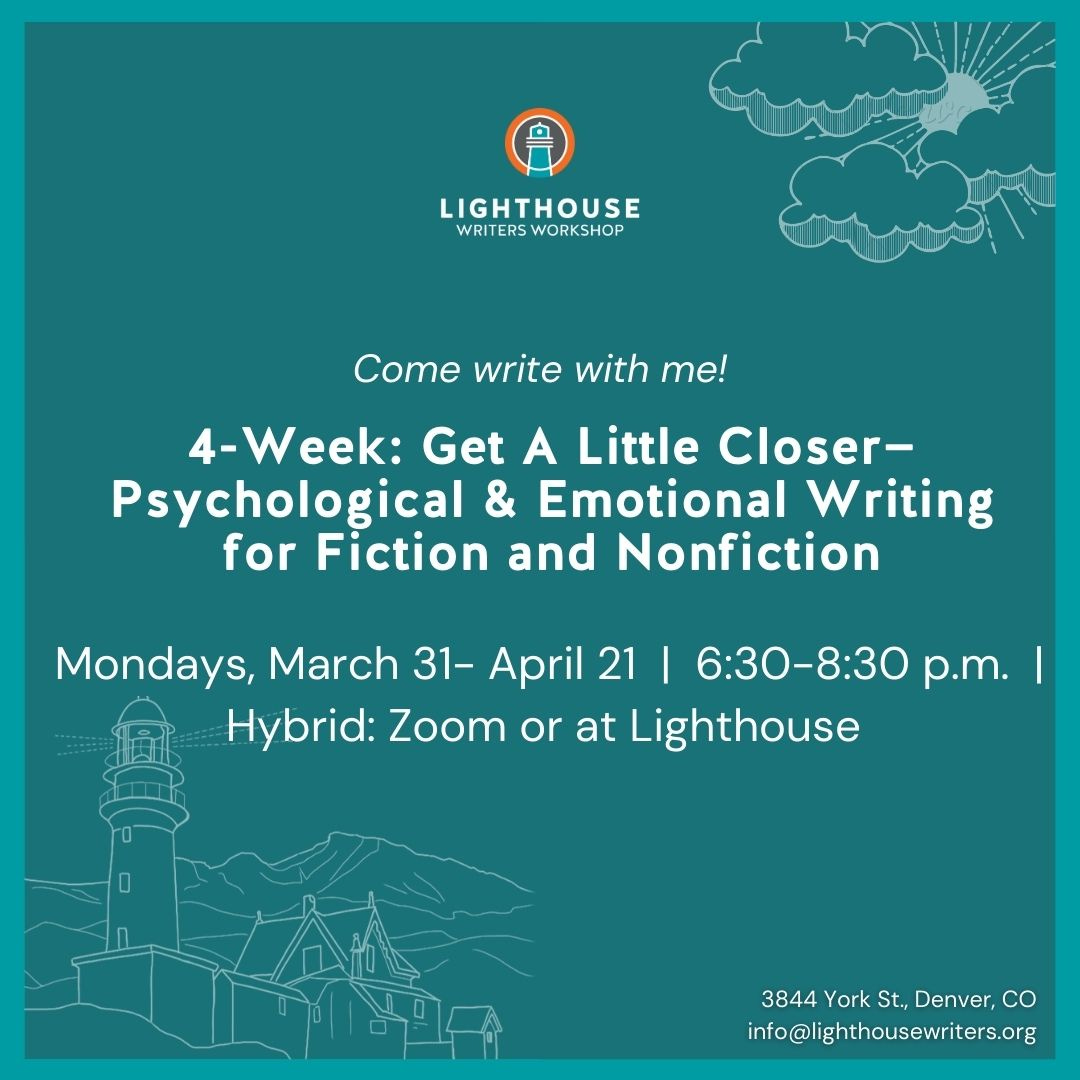These Prom Dresses Heal: Juicy Body Goddess, “The Substance,” and Our Capacity for Goodness
Also, Russell Westbrook launches a newsletter, a delightful book about quinceañeras, and spring happenings.
As we inch toward spring, I’ve been thinking about prom dresses, even though my days of purchasing them are far behind. In Colorado, proms are held in late April, but in the South right now, it’s already full-fledged prom season, and my favorite prom dress shop, Juicy Body Goddess, is humming with activity.
One day I was scrolling the internet, seeking not doom, as is customary, but something better: floof. I am still missing my departed rabbit Floppy, and sometimes I look at photos and videos of what other rabbits are up to. Somehow in my quest for rabbits—and I’m not sure what the algorithm was doing here—I came across the Instagram page of Juicy Body Goddess, a “Curvy & Plus-Sized Boutique” in North Carolina, selling dresses and essential accessories, such as Big O’Titty Tape, which is the actual, glorious name of an adhesive that keeps one’s girls positioned correctly.
Summer Lucille is the owner and founder of the store who shares videos of teenage girls modeling potential prom dresses, and once I started watching I could not stop. It was just what I needed: kindness, joy, and beauty.
As the teenagers model their gowns, you can guess from their shifting expressions and reactions which dress is the one. Their family members sit in plush chairs and coo over their daughters. Some of them tear up. Some of them hold up little signs, rating the dresses on a scale of one to ten—I’ve never seen a rating of less than six because if you have a daughter you know she brings everything she touches at least above average. Sometimes a dad runs around like a paparazzo, snapping photos of his daughter from every angle. And Summer Lucille, in her warm, honeyed voice, praises them all. Yes, she’s an expert saleswoman, but she’s also giving these girls affirmation that has likely been rare for them.
As Lucille posted, “Not stopping until every little girl & woman is healed & restored.” And there is evident healing going on, as each girl discovers in the three-way mirrors of the store that she is beautiful. Not that she’s going to be beautiful when she changes X, Y, and Z about herself, but that she’s beautiful right now.
As usual I’m very late to this trend. Juicy Body Goddess has hundreds of thousands of social media followers, and many of those watching send in donations for kids from low-income families to purchase their prom dresses. A few weeks ago, one mom scheduled a fitting for her daughter, but emailed to cancel it, saying she was a federal worker, and with the current uncertainty about her job, she couldn’t afford a prom dress. She offered to donate her deposit to another girl. Lucille advised her to keep the fitting appointment, and donations poured in to buy this girl a dress.
I saw the movie “The Substance” recently and I’ve been pondering that film next to what I’m watching on the Juicy Body Goddess social media channels. “The Substance” is a brilliant body horror movie, led by Demi Moore, who deservedly won a Golden Globe for her acting. The mechanism of the film’s horror is women’s self-hatred of their own bodies, which is reinforced by other people, their jobs, and society until it becomes internalized, and without giving too much away, the result is self-directed brutality. And now of course we have semaglutide drugs, lifesaving for diabetes patients, but also accessible for wealthy individuals—who do not have weight-related health concerns—aiming for “perfection.” But, as “The Substance” suggests, the quest for perfection is ultimately self-defeating. Who is to dictate what perfection is, exactly?
I recently enjoyed Trevor Noah’s interview with Dutch historian Rutger Bregman on his podcast What Now? Bregman is the author of several books, including Humankind: A Hopeful History, in which he posits that in contrast to the survival-of-the-most-ruthless ethos that is often held up as correct, there’s a lot of evidence that supports the idea of “survival of the friendliest.” That is, when we help each other and lift up each other, each of us benefits much more than when we hate, attack, and tear down each other.
Bregman also points out that the way people view the world often becomes a self-fulfilling prophecy. If you believe that other people are mostly dangerous, greedy, and stupid, then society builds walls against each other, imprisons massive amounts of people, suspects people performing essential jobs of “waste,” and normalizes all kinds of surveillance. The world becomes threatening and scary because of the way people have shaped it in their minds. But the opposite could also be true. What if we envision a world of generosity and support, an abundant world where beauty comes in infinite variations? Then you get a store like Juicy Body Goddess.
You could be cynical about this. You could ask, should families be spending all that money on an expensive dress, or should they be putting it toward their daughter’s education? You could point out that for all the altruism and love on display, it’s also brilliant marketing, and probably earns the shop lots of money. But I think Juicy Body Goddess is providing a service that few other businesses are stepping up to provide, and the young ladies it is showering with attention and affection were likely not receiving that love from elsewhere, if the messages of “The Substance,” the semaglutide craze, and nasty social media comments about women’s bodies are indicative.
The behavior displayed in these videos is downright countercultural, a celebration of a variety of girls that you don’t often see uplifted in the media. And the pride these parents display might actually be radical. They are showing the world: I love this child. This child is just as she should be. This child is worthy of adornment. This child is the source of my joy.
A prom dress can’t save the world, but it can make a young woman feel good about herself, confident, and treasured. And if a young woman feels this confidence, who’s to say the contributions she will make to society won’t be the ones to help us all? As anthropologist Margaret Mead said, “Never doubt that a small group of thoughtful, committed citizens can change the world. Indeed, it is the only thing that ever has.”
The Assorted Whimsy Portion of The Tumbleweed
It’s my duty to inform you that Russell Westbrook, 2017 NBA MVP, perennial All-Star, guy who has more dog in him than any other guy, and most importantly, current Denver Nugget, has launched a newsletter. When I came across his announcement, I shrieked and then clicked to sign up. Not only is Westbrook a great basketball player, he’s a wonderful human being, aiming with his Why Not? Foundation to improve the lives of underserved and low-income young people, with branches in Los Angeles (his hometown), Oklahoma City (where he began his career with the Thunder), and now Denver, my the place I have decided will love him the best of all.
The email I received in response to my signup assured me that the new newsletter, “The Word of Westbrook,” would provide:
“A front-row seat to the way I see the game, both on and off the court. From the biggest shifts in fashion to the best tunnel fits in sports, I’m bringing you my take, unfiltered. If it moves the culture forward, you’ll hear about it here.”
Tunnel fits, for those of you not quite as basketball-obsessed as me, are the fabulous outfits the players wear to walk from their audacious sports cars through the stadium tunnel to the locker room before they put on their uniforms.
When the email asked me to confirm my intention to sign up for “The Word of Westbrook,” I clicked my assent, thinking, please, I could not agree to receiving this newsletter more, and I was taken to Russell Westbrook’s LinkedIn profile. I felt as though I’d opened a door that led to an entirely unexpected room. LinkedIn is the opposite of a tunnel fit. While the later can be saucy, provocative, badass, bracing, or surprising, LinkedIn has the ambiance of a windowless fluorescent-lighted office. There are guys in there saying things like, “Here are ten ways to harness the power of A.I.”
So despite thinking Russell Westbrook was too good for LinkedIn, I was impressed to see, listed under his experience: “Professional Basketball Player,” a full time position that he’s held for 17 years and 3 months, a timespan during which I’ve probably held at least 17 different jobs.
But did wandering into LinkedIn like a disheveled sweatpants wearer with bedhead who did not expect this business call to be a Zoom with cameras on mean that I’d officially signed up for “The Word of Westbrook”? I don’t know. I’m perched in front of my email inbox, waiting for Russell Westbrook’s next communication. In the meantime, Kareem Abdul-Jabbar has a newsletter that is so thoughtful and engaged and full of cultural knowledge that it might tide us by until our first tunnel fit update.
The Book Recommendation Portion of The Tumbleweed
Mulling prom dresses reminded me a book I loved from years ago, Once Upon a Quinceañera: Tradition, Ritual, and Coming of Age in America by Julia Alvarez.
Alvarez travels all over the U.S., investigating the phenomenon of the quinceañera for the insights it offers about the Latino community and American culture. It’s thoughtful, warm, and funny, and I loved the chance to attend the 15th birthday celebrations of the young women featured in this book.
The Happenings & Links Portion of The Tumbleweed
I’ll be teaching two 4-week classes for Lighthouse this spring, both hybrid, so you can join on Zoom or in person at Lighthouse HQ. First it’s Get A Little Closer: Psychological and Emotional Writing for Fiction and Nonfiction, on Mondays, March 31-April 21 (6:30-8:30 p.m.). Next, it’s Seeing the Big Picture: Techniques for Revising Fiction and Nonfiction Books, on Tuesdays, April 29-May 20 (6:30-8:30 p.m.).
I thoroughly enjoyed reading all the finalists for the National Book Critics Circle’s John Leonard Prize for Best First Book. Watch the ceremony live on Youtube on March 20 to find out the winners!
I’ll be heading to Los Angeles for the AWP conference next week. I’ll sign copies of Mixed Company at the Texas Review Press booth on Thursday, March 27 at 11 a.m. and I’ll be on a panel on Friday, March 28 called “Making the Cut: What Judging Story Collection Contests Taught Us.” Led by Flannery O’Connor Prize editor Lori Ostlund, I’ll be talking about what made certain story collections stand out to me, alongside my fellow screener judges Toni Ann Johnson, Michael Wang and Hasanthika Sirisena. If you’re going to AWP, please let me know!
As always, The Tumbleweed welcomes your questions and comments about writing, reading, taco eating, the Denver Nuggets, rabbit wrangling, Deion Sanders, Ralphie the Bison, and baby seals.








Great post, as usual! If being kind is counter culture, then I'm counter-culture-as-fuck!